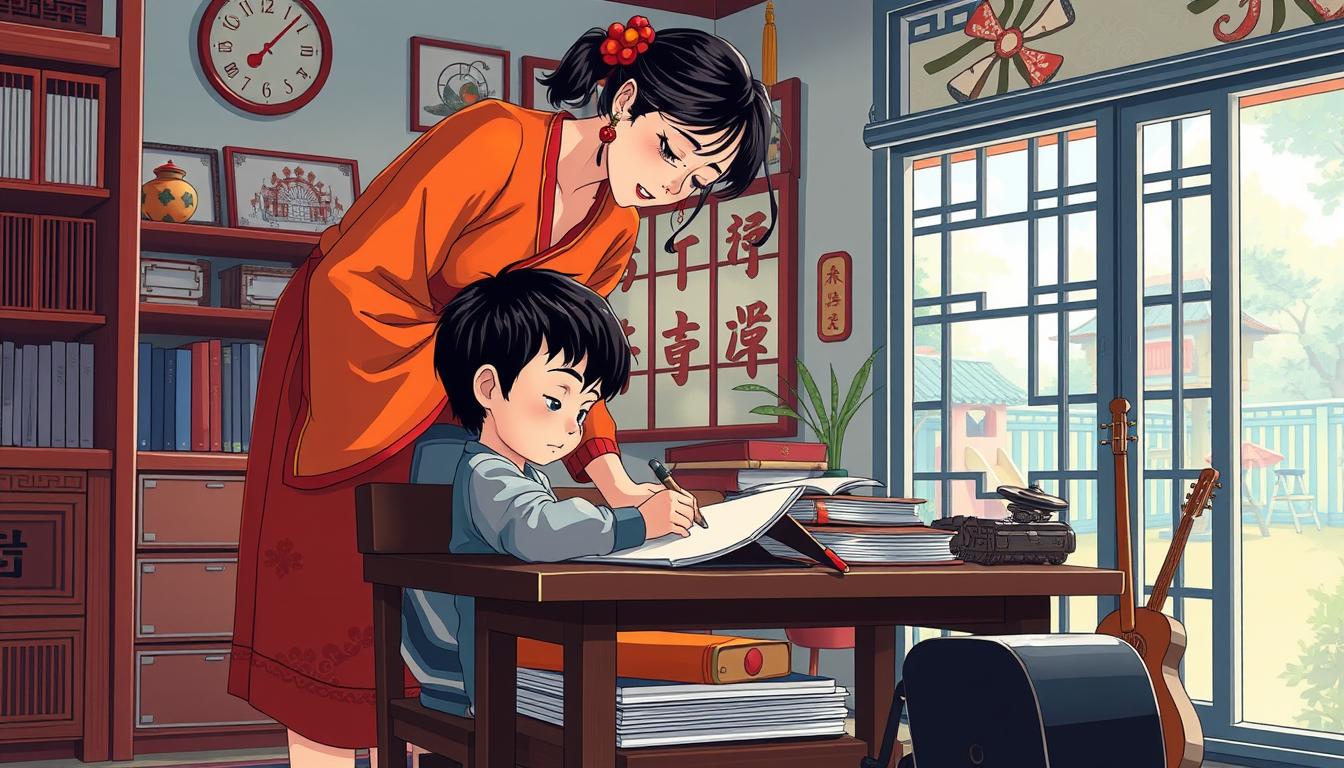Ever wondered why some parents push their kids so hard in school and activities?
Parenting challenges are a big topic in many American families. The term “tiger parenting” has become well-known thanks to Amy Chua’s book “Battle Hymn of the Tiger Mother” in 2011. Chua’s strict rules, like no TV or sleepovers, focus on high grades and music, reflecting her Chinese upbringing. Now, “tiger parenting” is often talked about when discussing strict parenting.
In the Asian American community, 28% of people say their parents are “tiger parents.” This style of parenting is getting a lot of attention. Parents are searching for tips on how to be positive about their kids’ bodies and talk to them about puberty. Why does tiger parenting work well but also have downsides? Research shows it can lead to great grades but also stress, low self-esteem, and trouble making friends.
Kids of tiger parents have very busy schedules, filled with school and activities. They might even go to SAT prep schools a lot. But this constant push can be very stressful. It can hurt their emotional health and how they grow up in the long run.
Key Takeaways
- Tiger parenting emphasizes high expectations for academic and extracurricular achievement.
- Influence from Confucian teachings and cultural importance of education drives tiger parenting.
- This style can lead to successful academic performance but also increases the risk of stress and poor socio-emotional health.
- Tiger parenting is particularly prevalent among Asian American families compared to other ethnicities.
- Children under tiger parenting may face long-term developmental challenges, including difficulties in forming close relationships.
- Balancing strict parenting practices with emotional support and open communication fosters better mental health and self-esteem in children.
Understanding Tiger Parenting
Tiger parenting has gained a lot of attention for its strict and hands-on approach to raising kids. It aims to boost academic success and achievements in sports and music. This method is very different from Western parenting styles, which often see it as too controlling.

Definition of Tiger Parenting
Tiger parenting is a strict parenting style that uses strict rules and high expectations. It’s highlighted in Amy Chua’s book, “Battle Hymn of the Tiger Mother.” This approach aims to make children resilient and successful. But today, tiger parents also focus on balancing family budgets, coaching sports, and keeping kids safe online.
History and Origins of Tiger Parenting
Tiger parenting comes from Confucian teachings, emphasizing hard work and knowledge. These ancient values aimed at academic success and character building. While it might seem strict to Westerners, it reflects a deep respect for education and discipline. Today, parents use online therapy to blend these values with modern challenges.
Key Characteristics of Tiger Parenting
Tiger parenting is known for strict discipline, high academic goals, and focus on extracurricular activities. Parents closely monitor school progress, enforce study schedules, and sacrifice free time for academic success. They also push kids hard in sports to teach discipline and competition. Modern tiger parents also worry about kids’ safety online, controlling their digital presence. This approach can lead to a stressed family life, with kids facing high pressure.
Roots in Confucian Philosophy
Confucian philosophy deeply influences tiger parenting. Confucius lived in the 5th century BC and taught about family loyalty, obedience, and the importance of education. These values still guide parenting today, including eco-friendly practices.

Influence of Confucian Teachings
Confucian teachings highlight the role of education in success and social mobility. Parents focus on their children’s education early on. These teachings also stress the need for resilience and duty, especially for women.
Cultural Importance of Education
Education is seen as a lifelong duty, not just for personal success. It leads to disciplined learning and high grades. Strict parenting is linked to better education, showing the cultural values at play.
Filial Piety and Parental Expectations
Filial piety, or “xiao,” is key in Confucian ethics. It emphasizes respect and obedience to parents and ancestors. This value system shapes parental expectations, often leading to high academic and respectful behavior in children.
Comparing Tiger Parenting to Other Parenting Styles
There are many ways parents raise their kids, each with its own effects. Tiger parenting is different from others like authoritarian, supportive, and permissive. Knowing how tiger parenting compares can help us understand its effects.
Tiger Parenting vs. Authoritarian Parenting

Tiger parenting is similar to authoritarian parenting in being strict. But tiger parents also show a lot of support and involvement. This mix aims to make kids excel and obey, but it can also lead to anxiety and depression.
On the other hand, authoritative parenting balances rules with warmth. This style is better for kids with anxiety because it offers a caring environment.
Tiger Parenting vs. Supportive Parenting
Supportive parenting is very different from tiger parenting. It focuses on emotional support and empathy, leading to better grades and social skills. For kids like those with middle child syndrome, supportive parents can give each child the attention they need.
But tiger parenting’s high standards and strict rules can hurt a child’s self-esteem and cause anxiety.
Tiger Parenting vs. Permissive Parenting
Permissive parenting is very lenient, which can hurt a child’s grades and social skills. It’s the opposite of tiger parenting’s strict rules. While permissive parents might have better communication, they struggle with discipline.
This makes teaching consent and building relationships with stepchildren harder. Tiger parents focus on excellence and obedience, which can reduce some problems but also increase stress and anxiety.
Impact of Tiger Parenting on Children
Many think tiger parenting leads to great academic success. But, studies show a more complex truth. A long study with 444 Chinese American families found tiger parenting can harm kids. It leads to lower grades, more stress, and depression.
Academic Performance and Success
Research shows tiger parenting might not guarantee top grades. Kids with strict parents often have lower GPAs. Only 20% of Asian families use tiger parenting. Most parents are supportive, which helps kids do better in school.
Socio-Emotional Health and Well-Being
Tiger parenting can hurt kids’ feelings and mental health. Kids may feel alone and depressed. The American Psychological Association says harsh parenting can be bad for mental health.
Ignoring a child’s need for gentle parenting can harm their emotional growth. This can make them more anxious and struggle with emotions.
Long-Term Effects on Personal Development
Tiger parenting’s effects last long after school. High expectations without emotional support can damage self-esteem and decision-making. A 2020 study found family pressure hurts teenagers’ mental health.
Too much pressure can make kids lose interest in learning. This can affect their ability to adapt and be resilient. But, with emotional support and balance, kids can thrive.
FAQ
What exactly is tiger parenting and why is everyone talking about it?
How does tiger parenting address parenting challenges?
How can I integrate talking to kids about puberty into tiger parenting?
What are some body positivity tips for kids under tiger parenting?
What is the history and origin of tiger parenting?
What are the key characteristics of tiger parenting?
How does family budgeting relate to tiger parenting?
Can coaching children’s sports fit into the tiger parenting model?
How do you ensure kids’ social media safety under tiger parenting?
What role can online family therapy play in tiger parenting?
How does Confucian philosophy influence tiger parenting?
Why is education culturally important in tiger parenting?
What is the concept of filial piety and how does it relate to tiger parenting?
How does tiger parenting compare to authoritarian parenting?
How does tiger parenting compare to supportive parenting?
How does tiger parenting differ from permissive parenting?
What is the impact of tiger parenting on a child’s academic performance and success?
How does tiger parenting affect a child’s socio-emotional health and well-being?
What are the long-term effects of tiger parenting on personal development?
Can gentle parenting coexist with tiger parenting principles?
How should tiger parenting address kids’ screen time?
How can remarriage and children be managed under a tiger parenting model?
How do you talk to kids about drugs within a tiger parenting framework?
This post contains affiliate links. If you click on a link and make a purchase, I may earn a small commission — at no extra cost to you. Thank you for supporting this blog and helping me keep the patterns free! Read the full Affiliate Disclosure & Transparency.
